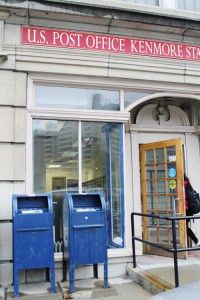Although the U.S. Postal Service stays afloat despite mounting debt, some Boston businesses and students said they do not use it and would not be affected if it shut down.

The USPS defaulted on its Sept. 30 payment of $5.6 billion for prefund retiree health benefits, the second missed payment since Aug. 1. It brings the USPS to $11.1 billion in undelivered mandated payments, according to a Sept. 26 release.
“Absent legislative action, the Postal Service is unable to make a scheduled $5.6-billion payment to the U.S. Treasury on Sept. 30,” the release stated.
A 2006 law mandates the post office to completely cover the healthcare costs of future retirees by paying between $5.4 billion and $5.7 billion per year from 2007 to 2016.
USPS advocates a comprehensive form of these laws for its “return to long-term financial stability,” according to the release.
The USPS experienced a $5.2-billion loss in the third quarter of the 2012 fiscal year, struggling with a debt that has been growing as far back as 2006 and raising questions on the postal service’s necessity.
Although the USPS continues to operate despite its economic situation, some business leaders said they do not often use the service.
“Most of the business we go through is online,” said Lucas Mulkern, assistant front of house manager at Hotel Commonwealth in Kenmore Square.
Mulkern said Hotel Commonwealth does not use physical mail often.
“The only time we send mail through the Postal Service is when a guest wants to send a letter, and we don’t do it that often for it [negative effects on the USPS] to impact us,” he said.
Patrick Scanlon, sales supervisor at Ace Tickets in Fenway, said that while the business uses mail services frequently, it does not often use the USPS.
“We don’t use them [the Postal Service] at all,” he said. “Most of the tickets we send out to people go through FedEx.”
Scanlon said he does not believe the USPS’s burdens will affect people much, as physical mail is more popular among older generations.
But Michelle Rothman, sales associate for West Elm in Fenway, said her business often uses USPS.
“Our store sends letters, receipts and catalogs to our customers through the Postal Service,” she said. “If something should happen to it, there would be a huge effect on us.”
She said her business cannot afford other mail services.
“FedEx is so expensive and we don’t want to pay that all the time,” she said.
Mulkern said higher costs of other providers would be an issue for people, especially college students.
“Boston is a big college community,” he said. “College students don’t have a lot of money to begin with, and they are looking for cheap ways to mail out items.”
Connor Love, a Boston University School of Management freshman, said he sees USPS as vital.
“I use the Postal Service all the time,” he said. “I’m from Nevada and my family ships me things all the time. I don’t know how we would get along without the Postal Service.”
But College of Arts and Sciences junior Charlie Aoun said he does not often use USPS.
“At this point, because of other ways of communicating, closing or reducing service [it] wouldn’t have as much of an impact,” he said. “However, a lot of people rely on it.”